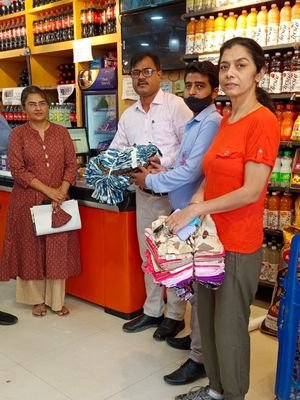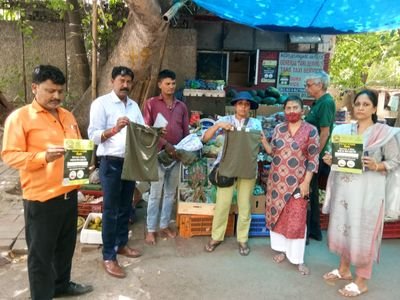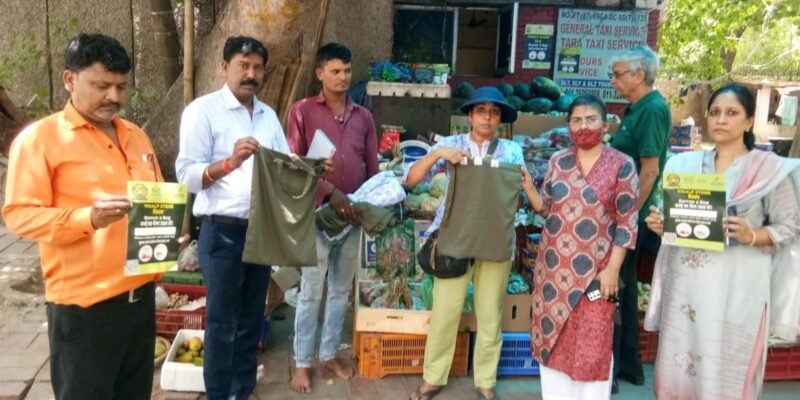In a mission to spread cleanliness and zero waste management, residents from Navjiwan Colony, New Delhi took the initiative to clean their society and follow the rules of keeping the environment sustainable by adopting green steps.
In its Central Zone, the Municipal Corporation of Delhi (MCD) has launched a ‘Zero Waste Colony’ campaign. This one-of-a-kind initiative aims to streamline municipal solid waste (MSW) management and drastically reduce the MCD’s current logistics costs.
Residents of Navjiwan Colony have pledged to implement a zero-waste management plan in their community. They have devised solutions ranging from wasting food to donating clothing to the needy to harvesting rainfall.
Many residents in Delhi have adopted No Waste Management, and it should be implemented in every household to reuse, recycle, and reduce for a cleaner environment.
Mad4India brings an inspiring and ever-changing story of the residents of the Navjiwan colony who pledge Zero Waste Management.
Zero Waste Management Campaign

Each member of the Navjiwan society is responsible for environmental preservation. One such responsibility is to ensure that no food is wasted and that the remaining vegetables or fruit peels, as well as the remaining food, are composted for future use, resulting in organic manure. The Zero Waste Management policy is followed and sampled discreetly.
Under the initiative of no waste localities, the society also commits to ensuring that used or “pre-loved” clothing is not discarded but given to those in need. Clothes will not be discarded this way but rather be used by the needy. Zero Waste Management ensures that people and the environment are treated fairly.
It also claims that water is not wasted and that society has a water waste harvesting pit. A resident’s responsibility is to ensure that no water is wasted and thus is harvested.
The gardens are also kept clean, and no dry leaves are deserted or littered on the road to make it look awkward and unclean.
However, it is astounding to see that a colony with 250 residents and more than 1000 people has been adamant about its duties and responsibilities toward cleanliness and a Zero Waste Management program. Members decided to address the issues progressively, with MCD, the civic body, coming to educate and empower them.

But, what were the pillars of making Zero Waste Management work? The members made it a top priority to separate dry and wet waste. The dry waste is recycled, while the wet waste is composed. But was it that simple?
Society has set up a compost pit where all of the colony’s wet waste is dumped. Compost is used in gardens and parks, and while it does not improve soil quality, it ensures that there is no waste in landfills. The Navjiwan colony produces up to 10,000 kg of compost as part of its zero-waste initiative.
Under the no waste management initiative, the society took a program where they distributed sanitary napkins, which were biodegradable, so as not to harm the environment. You can read about 7 biodegradable, green sanitary pads, which is a comfortable choice than existing options.
The members decided to provide free sanitary napkins to women under a program to educate the helpers on Zero Waste Management.
Moreover, applying the Zero Waste Management, the residents have also engraved a shredder that can make compost from dry leaves, making the garden and road clean and utilizing the waste materials.
Members have also installed water harvesting pits throughout the colony to collect rainwater and charge the flow of groundwater. In addition, residents have installed aerators in their house taps to reduce the flow of water and allow it to be used more efficiently, ensuring no water management.
With rainwater being wasted, you can read how NeeRain is saving 1000 liters of water with its rooftop water harvesting product.
It should come as no surprise that many people in the Navjiwan colony produce enzymes on their own using peels and sour products. It is a natural chemical-free liquid cleansing agent that aids in the cleaning of spots, basins, and other household items.
When homemade enzymes are used, two things happen. For starters, we avoid using chemical cleaners, and it also keeps waste plastic bottles from being dug up in nature. Learn about the recent ban on single-use plastic in India.
The Zero Waste Management program for societies in Delhi has affirmed people to take steps to ensure cleanliness and hygiene across all formats. Mad4india hopes to see more colonies and societies adopting the Zero Waste Management campaign in the locality area for better sustainability.
If you loved reading this story, you can also read about India Bans ‘Single Use Plastic Bags’ – Read How Will It Impact You
If you know more inspirational stories about a person, company, new idea, or social initiative, and want us to write them on mad4india.com, share such information with us on Facebook and LinkedIn.



